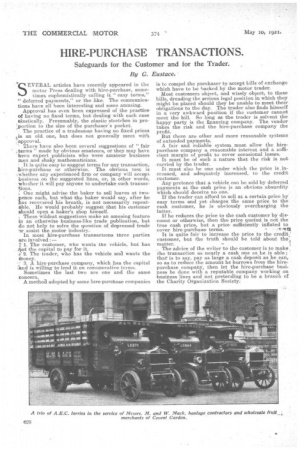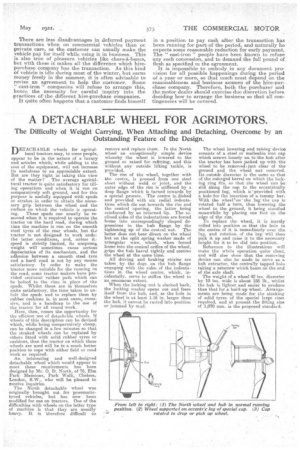HIRE-PURCHASE TRANSACTIONS.
Page 22

Page 23

If you've noticed an error in this article please click here to report it so we can fix it.
Safeguards for the Customer and for the Trader. By G. Eustace.
SEVERAL EVERAL articles have recently appeared in the motor Press dealing with hire-purchase, sometimes euphemistically calling it " easy terms.," "deferred payments," or the like. The communications have all been interesting and some amusing.
Approval has even been expressed of the practice of having no fixed terms, but dealing with each case elastically. Presumably, the elastic stretches in proportion to the size of the purchaser's pocket.
-. The practice of a tradesman having no fixed prices is an old one, but does not generally meet with 1• ; approval There have also been several suggestions of "fair ,terms" made by obvious amateurs., or they may have 'beeu expert publicists who were amateur business men and shaky mathematicians. ' it is quite easy to suggest terms for any transaction, hire-purchase or otherwise. The obvious test is -.whether any experienced firm or company will accept business on the suggested lines, or, in other words, whether it will pay anyone to undertake such tra,nsac , One might advise the baker to sell loaves at twopence each, but what the baker would say, after he has recovered his breath, is not necessarily repeatable. He would probably suggest that his customer should open a baker's shop himself. ,• These wildcat suggestions make an amusing feature in an otherwise business-like trade publication, but do not help to solve the question of depressed trade • ar assist the motor industry.
In most hire-purchase transactions three parties are involved :— II: 1. The customer, who wants the vehicle, but has 09.ot the capital to pay for it. a 2. The trader, who has the vehicle and wants the Money.
–8. A lure-purchase company, which has the capital ., and is willing to lend it on remunerative toms.
Sometimes the last two are one and the same concern.
. A method adopted by some hire-purchase companies is th compel the purchaser to accept bills of exchange which have to be hacked by the motor trader.
Most customers object, and wisely object, to these bills, dreading the serious legal position in which they might be placed should they be unable to meet their obligations to the day. The trader also finds himself in a very awkward position if the customer cannot meet the bill. So long as the trader is solvent the happy party is the 'financing company. The vendor takes the risk and the hire-purchase company the profit. But there are other and more reasonable systems of extended payments. A fair and reliable system must allow the hirepurchase company a reasonable interest and a sufficient margin of profit to cover occasional losses. It must be of such a nature that the risk is not carried by the trader. It ,must also be one under which the price is,increased, and adequately increased, to the credit customer.
Any pretence that a vehicle can be sold by deferred payments at the cash price, is an obvious absurdity which should deceive no one.
If the trader can afford to sell at a certain price by easy terms 'and yet charges the same price to the cash customer, he is obviously overcharging the latter.
If he reduces the price to the cash customer by discount or otherwise, then tho price quoted is not the true cash price, but a price sufficiently inflated to cover hire-purchase, terms. It is quite fair to increase the price to the credit ' customer, but the truth should be told about the' matter.
The advice of the writer to the customer is to make , the transaction as nearly a cash one as he is able,; • that is to say, pay as large a cash deposit as he can, so as to reduce the amount he borrows from the hirepurchase company, then let the hire-purchase business be done with a reputable company working on business lines and not pretending to be a branch of the Charity Organization Society:
There are less disadvantages in deferred payment transactions when on commercial vehicles than or private cars, as the customer can usually make the vehicle pay for itself while -using it in business. This is also true of pleasure vehicles like chars-a.-hancs, but with these it makes all the difference which hirepurchase company has the transaction. As this kind of vehicle is idle during most of the winter, but earns money freely in the summer, it is often advisable to revise an agreement to help the customer. Some "
cast-iron" companies will refuse to arrange this, henco the necessity for careful inquiry into the practices of the different hire-purchase companies. It quite often happens that, a customer finds himself in • a position to pay cash after the transaction has been running for part of the period, and naturally he expects some reasonable reduction for early payment. The " cast-iron " people have been known to refuse any such concession and to demand the full pound of flesh as specified in 'the agreement.
It is impossible to embody in any document pro'vision for all possible happenings during the period of a year or more, so that much must depend on the reasonableness and business acumen of the hire-purchase company. Therefore, both the purchaser and the motor dealer should exercise due discretion before deciding how to arrange the business so that all con tingencies will be covered. .
































